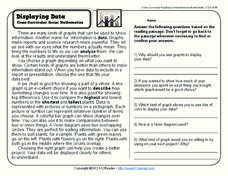K12 Reader
Solar Eclipse
A passage about solar eclipses provides readers with an opportunity to demonstrate their ability to identify the main idea and supporting ideas in an article.
K12 Reader
Major Art Periods
After examining a brief article about the major art periods, readers use the provided graphic organizer to identify the main idea and supporting ideas in the paragraph.
K12 Reader
The Greatest President
Who is the greatest US president? George Washington? Abraham Lincoln? FDR? Find out the opinions of your young historians with this cross-curricular writing prompt that engages them in researching the accomplishments of these influential...
K12 Reader
A Planet in the Solar System
Take young scientists on an exploration of the cosmos with this cross-curricular writing exercise. Tasked with producing an expository composition describing a planet of their choosing, students perform research and present their...
K12 Reader
Call of the Wild
Using a paragraph from Jack London's Call of the Wild, readers demonstrate their ability to identify the main idea and supporting ideas in a passage.
K12 Reader
Black Beauty
A paragraph from Anna Sewell's Black Beauty provides middle schoolers an opportunity to demonstrate their ability to identify the main idea and supporting ideas in a passage.
K12 Reader
Ben Franklin
Readers are asked to use the provided graphic organizer to list the main idea and supporting ideas in a passage about the inventions of Benjamin Franklin.
K12 Reader
Planets
Readers are asked to identify the main ideas and supporting ideas in a passage about the eight planets in our solar system.
K12 Reader
The Legend of Sleepy Hollow
Washington Irving's description of Ichabod Crane provides young readers with an opportunity to demonstrate their ability to identify the main idea of a passage.
K12 Reader
Anne of Green Gables
A passage from Lucy Maud Montgomery's Anne of Green Gables provides young readers with an opportunity to demonstrate their ability to identify the main idea and supporting ideas in a paragraph.
K12 Reader
Find the Main Idea: The Wonderful Wizard of Oz
Readers are asked to use the provided graphic organizer to list the main idea and supporting ideas in a passage from L. Frank Baum's The Wonderful Wizard of Oz.
K12 Reader
Long Vowels
Keep things short and sweet for your young learners with a simple long vowel worksheet. Presented with four long vowel words with the vowels missing, children must correctly identify and write in the letters that complete each word.
K12 Reader
The Louisiana Purchase
Readers are asked to identify the main idea and two supporting ideas in a brief passage about the Louisiana Purchase.
K12 Reader
Find the Main Idea: The Meerkat
After examining a short article about African meerkats, readers identify the main idea and supporting ideas in the paragraph.
K12 Reader
Dolphins
Dolphins are the focus of a short comprehension exercise that asks readers to identify the main idea and supporting ideas in the passage.
K12 Reader
The Jungle Book
Young readers complete a graphic organizer identifying the main idea and the supporting ideas in a passage taken from Rudyard Kipling's The Jungle Book.
K12 Reader
Using Similes
Your class will find using similes as easy as pie after completing this figurative language exercise. Provided with a list of incomplete similes, young writers must use their creativity to fill in the blanks with nouns that accurately...
K12 Reader
What Is a Simile?
As fun as a barrel of monkeys, this figurative language worksheet will engage your students in learning to write similes. Asking them to first think of adjectives describing the six nouns listed on the page, this exercise has young...
K12 Reader
Displaying Data
It's important to learn how to display data to make the information easier for people to understand. A reading activity prompts kids to use context clues to answer five comprehension questions after reading several paragraphs about...
K12 Reader
Making Predictions
Read efficiently and effectively with a passage about making predictions and using headlines and visual aids as clues. After kids read a few paragraphs in the passage, they answer five comprehension questions on the side of the page.
K12 Reader
The Scientific Method
Introduce the scientific method with a reading comprehension activity. Have kids read a few paragraphs that describe the process of making a hypothesis, gathering evidence, and taking notes that will support the experiment.
K12 Reader
Why Does the Moon Orbit Earth?
Have you ever looked up at the moon and wondered why it looks different every night? Learn about the moon's orbit and the lunar cycle with a reading comprehension exercise. Using context clues, kids find the definitions of unfamiliar...
K12 Reader
Branches of Government
Set down the basics of the three branches of government with the reading passage included here. After reading, class members answer five questions related to the passage.
K12 Reader
What’s Your Angle?
Start out with angles by asking your pupils to read this reading passage. Class members will learn about degrees, right angles, acute angles, and obtuse angles and then respond to five questions about the text.

























